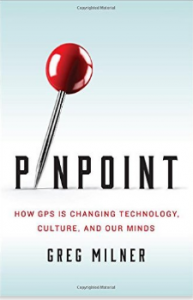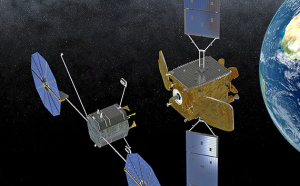
Pinpoint: The neuroscience of cognitive maps

Global Positioning Systems has conquered the world, and become an essential global utility free at the point of use, as our reliance on GPS extends in the past couple of decades, goes way beyond the satellite navigation, as it made paper maps obsolete.
GPS helps land planes, route mobile calls, anticipate earthquakes, predicts the weather, locate oil deposits, measure neutrinos. In Pinpoint Greg Milner reveals the hidden system that touches almost every aspect of our modern life. A single flaw could shut down the electrical grid, hijack drones or halt the world financial system.
A constellation of over 20 satellites was launched during the 1980s, orbiting 20,000 km above the Earth and can they live up to their claims of its accuracy.
Boat owner was the first to adopt this technology like a fish to the water.
GPS demonstrated Satnav guided weapons, aircraft, and soldiers in their attack on Sadam Hussien and according to Milner “Thanks largely to GPS, the Coalition completed the first large-scale deep desert advance in the history of warfare without any glitches”.
The American journalist explains how the American military advanced their heritage and management of GPS, underpinning the world’s communications and transport infrastructures.
The $27m GPS global market tripled from 2011, but the real economic value can run into trillions of dollars.
GPS began in 1970s, initially as a Pentagon project to improve the accuracy of their strike bombers. Brad Parkinson, a US Air Force engineer said: “the mission of the GPS Joint Program Office was to drop five bombs in the same hole.” The development of the GPS was initially delayed as the rivalry between the US Navy and Air Force fought for control as some officers doubted whether GPS would live up to the claims made of its accuracy. After the war, civilians were seeing the potential of GPS for other uses. In 1983, a Soviet Union fighter shot down a South Korean airliner that strayed into forbidden airspace as a result of a navigation failure. GPS had huge commercial potential but some Pentagon officials were unhappy that potential enemies could access their super-accurate positioning, so they put up selective availability offering a degraded signal for civilian use and retained the most accurate service encoded for its own military, but by 2000 technical developments had made the dual system untenable.
European politicians 15 years ago agreed to build Galileo, a credible alternative to GPS that should be fully operational by 2020.
Intense solar activity has caused temporary disruption to GPS signals.
Pinpoint: How GPS is changing Our World by Grey Milner, Granta £14.99/ WW Norton $27.95 336 pages.


